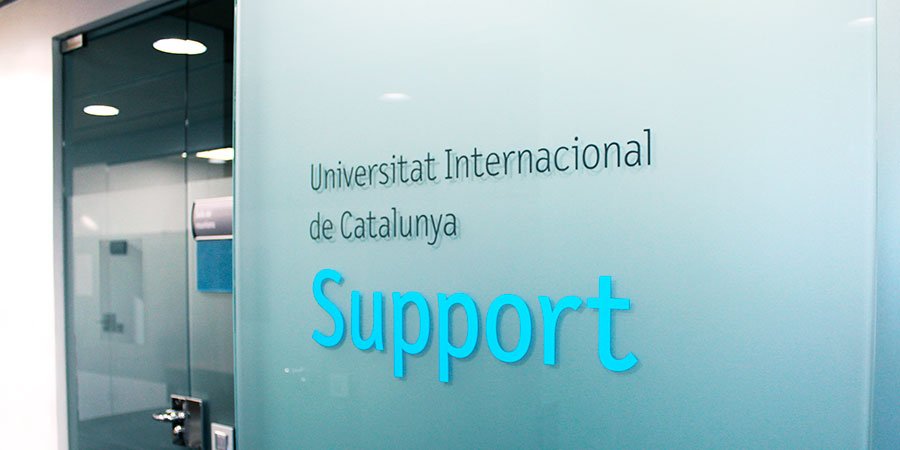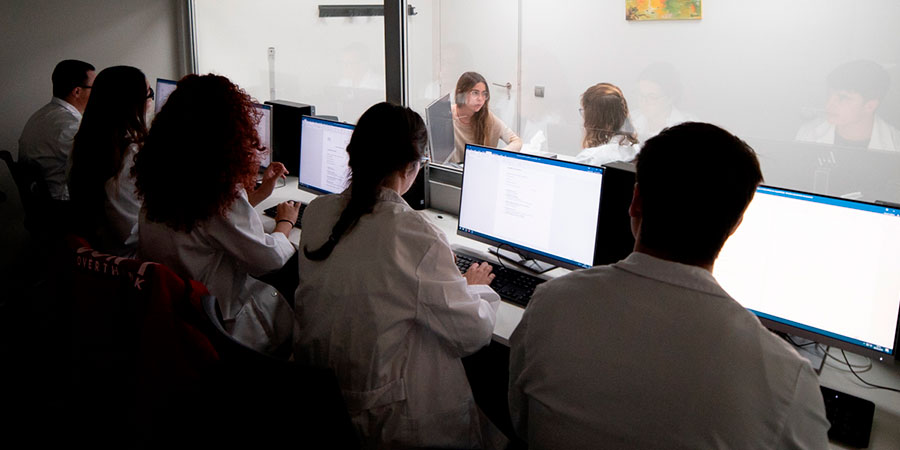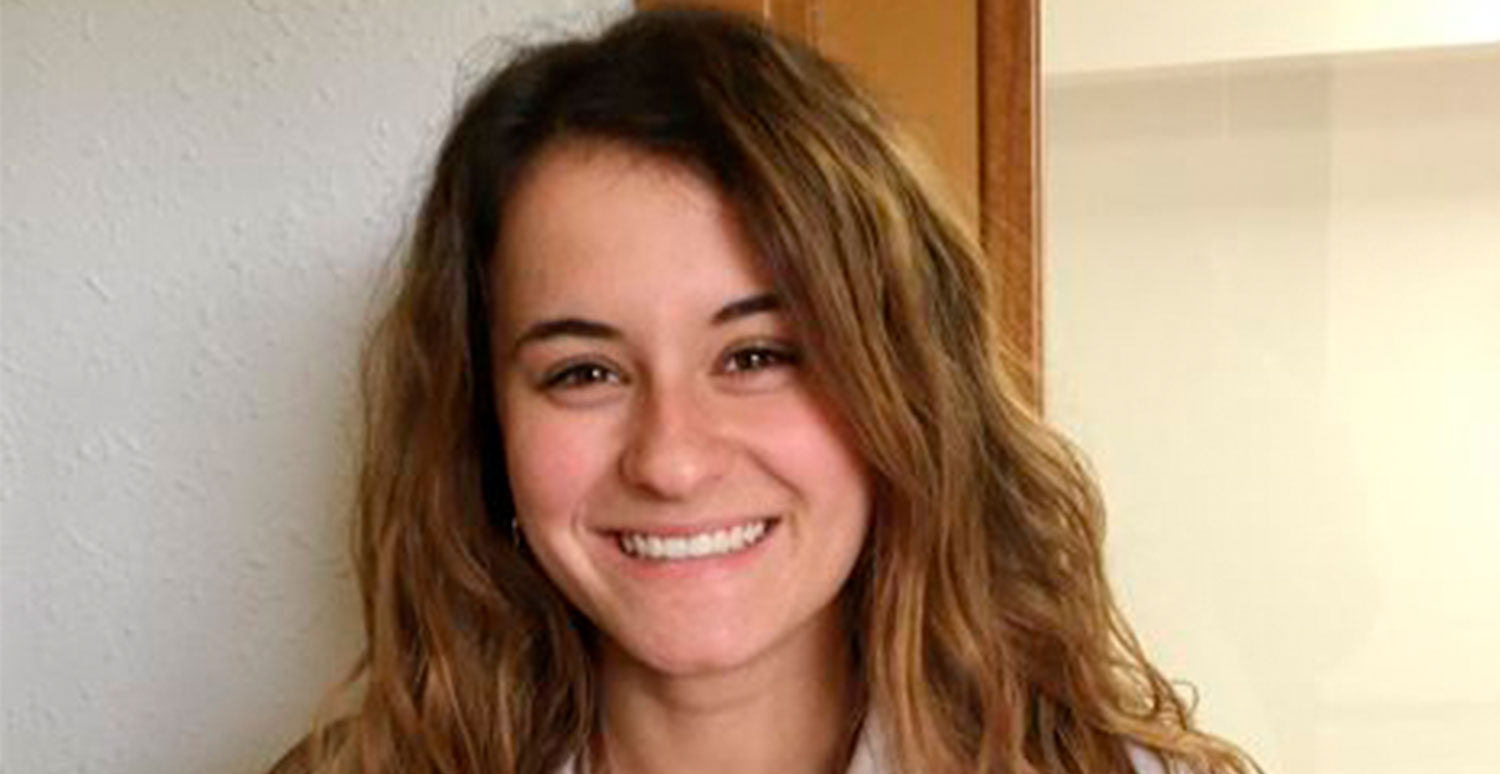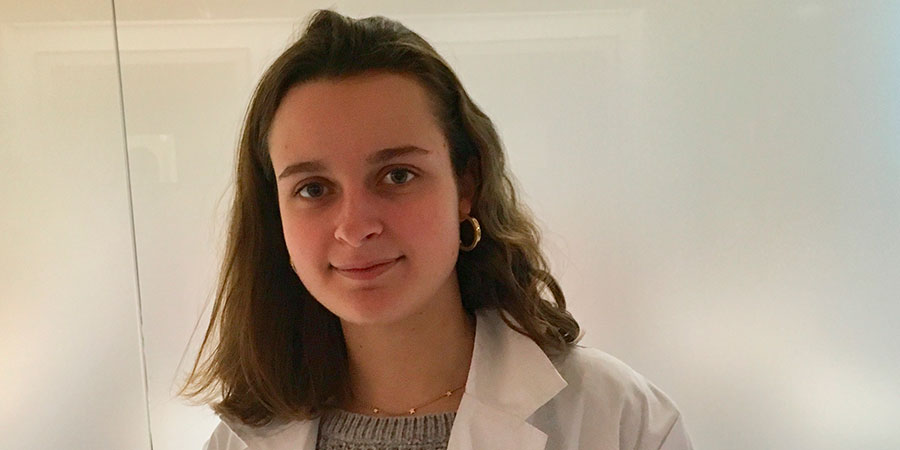Bachelor’s Degree in Psychology
Welcome Session - September 2023
Become a psychologist of the future
Prepare for more career opportunities
With the Degree in Psychology you will have a wide range of career options.
- PIR (Resident Psychologist)
- Private Sector or Healthcare Third Sector Psychologist
- Gerontologist
- Researcher
- Social Researcher
- Human Resources/Business Consultant
- Third Sector Technician (Master's in Social, Community and International Cooperation Psychology)
- Social Work Adviser
- Physical Activity and Sports Psychology
- Criminologist, Forensic and Penal Psychologist
- Educational Guidance Counsellor
- Learning Disorder Psychologist
- Speech Therapist
- Work Guidance and Training
- Teacher at Education Centres
- Teacher for Adults
The path to professional success. Take it

Observe real cases from year 1
Thanks to our Support Clinic, specialised in Psychology and Psychiatry for adults and children, you can experience and apply everything you learn throughout the degree.

Guided towards advanced training (PIR)
Prepare for the Resident Psychologist exam and access master's connected to different routes.

Innovative teaching
A curriculum designed with closely related subjects and shared practical cases, with many small group workshops that will allow for a more personalised education.
We are the only Spanish university with a Degree in Psychology that uses the ECOE (objective structured clinical evaluation) methodology
At the end of each academic year, our students take a practical exam in which they treat different cases related to the topics covered during the course. This exam is held in our Comprehensive Centre for Advanced Simulation, and we use actors to recreate a real professional environment.
Students tell you their experience

“The reason why I chose UIC Barcelona was because its health degrees had good references. Now that I have been studying the Degree in Psychology for one year at UIC Barcelona, there are several aspects that I love about studying here: for me, it has been a luxury and great opportunity to combine theory and practice from the first year, being able to see real cases brings us closer to our future profession and, at the same time, helps us to see if this is really the job we want. I would also highlight the lecturers' friendliness and flexibility. And, lastly, my classmates. In general, there is a good vibe and team spirit.”
Paula Martínez Santín
Psychology student

“I decided to study psychology at UIC Barcelona because of the privilege of practicing on real cases from year 1. Also because of my personal relationship with the lecturers and how they prepare you for the Resident Psychologist exam from day one.”
Clara Zanuy de Prat
Psychology student
Professors and lecturers active in their field with multidisciplinary experience

Work in renowned hospitals, businesses and clinical centres
Presentation
Bachelor’s Degree in Psychology with three ingredients: scientific rigour, guidance for professional practice and comprehensive education for students
In a social environment in which psychological help is increasingly required, the Bachelor’s Degree in Psychology from UIC Barcelona will help professionals acquire the scientific knowledge that is necessary to analyse, understand, interpret and explain human behaviour.
This degree also allows students to learn basic skills and abilities in the university’s own Psychology Clinic where they will evaluate and intervene at an individual and social level throughout the life cycle. The purpose of this is to promote and improve people’s health and quality of life and prevent physical and mental illnesses through specific interventions.
All students finish the Bachelor’s Degree with the Health Psychology major.
Reasons to take this Bachelor’s Degree at UIC Barcelona. Observation of real cases from the first year in our own clinic
UIC Barcelona has its own Psychology and Psychiatry clinic (SUPPORT), for our Bachelor’s degree in Psychology.
Teaching innovation
The curricular design ensures that subjects which are closely related to each other are linked through shared practical cases and a high number of workshops in small groups.
Higher education guidance
Preparation for the official PIR exam from first year onwards and access to master’s degrees in the various specialisations.
Campuses and multidisciplinary team
You will study on our Healthcare Campus, in a hospital and multidisciplinary university environment.You will also receive an interdisciplinary qualification, learning alongside teams of doctors, nurses, dentists, and physiotherapists.
Prospective students
Anyone who fulfils the admission requirements and general prerequisites for access to the degree programme may apply.. On the other hand, the following skills should also be underlined:
- An interest in helping people and the community
- Emotional balance and empathy
- The ability to self-reflect and be self-critical
- The ability to observe, analyse and synthesise
- Responsibility and a strong work ethic
- The ability to organise and plan
- An interest in research
- The ability to work in a team and cooperate with other professionals
Objectives and competences achieved by outgoing students
- You will acquire the knowledge that defines and organises psychology into a scientific discipline, including its theories, methods and areas of application. Additionally, you will learn how to apply it in order to identify and resolve problems in the field of psychology.
- You will be able to work in a general professional context and join Master’s degree programmes that will provide you with a more advanced education aimed at academic, professional or research specialisation in the area of psychology.
- You will gather and interpret significant data on human, individual and social behaviour within the context it is produced in, in order to issue judgements about problems that are psychological in nature.
- You will obtain psychology-specific competences that promote the mental health of individuals and social groups, and address physical and mental illness through specific interventions.
- You will be capable of transmitting ideas and solutions on issues related to human behaviour, for both specialist and non-specialist audiences.
- You will learn how to tackle educational and professional activities based on respect for the profession’s ethical code, which, among other more specific items, includes the principal of respecting and promoting people’s fundamental human rights, equality, the principle of universal access for all people and the democratic values of a culture of peace.
- You will acquire an anthropological grounding that will allow you to always interact in an ethical way with people, families and other professionals while taking human dignity into account in all situations.
All of these objectives will be achieved through the deployment of the basic, general, cross-disciplinary and specific competences acquired through the Bachelor's Degree in Psychology. The Bachelor’s degree allows you to take general psychology classes.
Competences
Competences of the Bachelor's Degree in Psychology
Academic accreditation
Graduat o Graduada en Psicologia per la Universitat Internacional de Catalunya, with the mention Health Psychology.
Teachers
- ABDÓ MIGUEL, Andrea
- ACOSTA GALLEGO, Ana
- AGUIRRE PACHECO, Candida Isabel
- AGUSTINA SANLLEHÍ, Maria
- ALARCON BONET, Anna
- ALEGRET LLORENS, Maria Monserrat
- ALSINA CASANOVA, Mª Guadalupe
- ALUCÓ SÁNCHEZ, Elena
- ANDRÉS GÁRRIZ, Clara
- ANGLÈS CABAU, Núria
- ARAGAY VICENTE, Nuria
- BAGNOLI, Doriana
- BARANGÉ CRESPO, Juan
- BÁRBARA SIRERA, Marta
- BASTONS PRAT, Miquel
- BATLLORI DE RIBOT, Blanca
- BERROZPE BLASCO, Adela
- BOSCH FALGUERAS, Mireia
- BOSCH SABATER, Joan
- BRAÑAS OLIVERAS, Cristina
- BUSQUETS BUEREN, Núria
- CANET VINTRÓ, Máxim
- CARBALLO MARQUEZ, Anna
- CARDONA SALES, Sara
- CARIDE PADILLA, Cristian
- CASTELLANO PALMA, Jose Javier
- CASTELLVI OBIOLS, Pere
- CERVANTES SANJUAN, Mercedes
- CERVERA CLAUDIO, Òscar
- CILVETI PORTILLO, Robert
- CLOSAS DIEZ, Sofía
- COLOMBARI, Ruggero
- COLOMBO BONALDI, Valeria
- CORDERO OTERO, Gaël
- CRESPO MARTIN, Iris
- CUVELIER, Alanna
- DAPENA I TAMARGO, Marc
- DEUSTUA CARAVEDO, Maria Cecilia
- DÍAZ MENÉNDEZ, Begoña
- DÍEZ DEUSTUA, Patricia
- DIP PÉREZ, Maria Emilia
- DOMÈNECH I GARCIA, Georgina
- DONADA MOLINS, Carmen Maria
- DURALL RIVAS, Maria Eulalia
- ENERO GONZÁLEZ, Cristina
- ESCALERA CÁMARA, Sandra
- ESCRIBANO LÓPEZ, Francesc Xavier
- ESPINOSA CARDIEL, Ana
- ESTAPE MADINABEITIA, Tatiana
- EZQUERRO RIQUELME, Neus
- FERNÁNDEZ BORSOT, Gabriel
- FERNÁNDEZ CAPO, Maria
- FERNÁNDEZ MENASSÉ, Sergio Gustavo
- FUHRMANN VERDAGUER, Cynthia
- FUSTÉ ESCOLANO, Adela
- GÁMIZ SANFELIU, María Guadalupe
- GARCIA CABALLERO, Anna
- GARCÍA CASANOVAS, Anna
- GARCÍA PEÑALVER, Marina
- GAROLERA FREIXA, Maite
- GARRIDO GARCÍA, Gemma
- GASOL MORROS, Xavier
- GASSÓ MOSER, Aina Maria
- GIL BELTRAN, Ester
- GIRONZA MARQUÉS, Alfonso
- GÓMEZ BORGES, Ari
- GÓMEZ DURÁN, Esperanza Luisa
- GONDÓN ESPINASA, Núria
- GUASCH TORRENT, Joan
- HAYDON LAMBERTI, Mercedes Helena
- HERMS FONTQUERNI, Renata
- JIMÉNEZ YÁÑEZ, Ricardo María
- LASTRA MARTÍNEZ, Andrea
- LEÓN CABRERA, Patricia
- LIDÓN MOYANO, Cristina
- LOOSSENS, Rudi Irma Karel
- LÓPEZ GARCÍA, Francisco José
- LÓPEZ MADRIGAL, Claudia
- LORENZO IZQUIERDO, David
- LOZANO NUÑEZ, Olga
- LOZANO SOLDEVILLA, Diego
- LUCAYA FORCADA, Beatriz
- MALET VILADOMIU, María
- MARIMON MUÑOZ, Eduardo
- MARTÍNEZ CARDOZO, María Luján
- MARTÍN FUMADÓ, Carles
- MARTORELL MORALES, Marta
- MARTOS ALGARRA, Carla
- MATEOS GAMARRA, Maria
- MEDINA PÉREZ, Laura
- MENEGHEL, Isabella
- MISIOLEK KOZIK, Alejandra
- MORENO MORENO, Mercedes
- MORENTE FANALS, Ana
- MOYA RUIZ, Albert
- NARVÁEZ PERALTA, Vanessa
- OLIVER JANÉ, Mónica Maria
- ORTEGA LINARES, Gema
- ORTIZ GUERRA, Belinda
- ORTIZ VALEN, Sonia
- PALACIOS VILCHEZ, Sonia
- PAMIAS MASSANA, Montserrat
- PIJUAN GONZÁLEZ, Laia
- PLANELLS KELLER, Kalia
- PORCEL RODRIGUEZ, Oscar
- PORRAS GARCIA, Bruno Oriol
- PUJALS ALTÉS, Elena
- PUJOL SERRA, Susana Maria
- RAMI PINA, Anna
- RAMÍREZ GONZÁLEZ, Jaime
- RAMO GONZALEZ, Ingrid
- RECODER FERNÁNDEZ, Silvia Alicia
- REDONDO LÓPEZ, Nieves
- RODRÍGUEZ PRAT, Andrea Mercedes
- ROSSY I PARÉS, Clàudia
- SALIDO BELLMUNT, José Luis
- SALÓ ROVIRA, Anna
- SAMPOL MANERA, Carme
- SANJUAN SATORRA, Judith
- SANTACANA JUNCOSA, Martí
- SANTAMARÍA GARCÍA, Marina
- SOLER ROCA, Ana
- TITSCH COCA, Ana Maria
- TORRENS LLUCH, Marina
- TOST BONET, Meritxell
- TRESSERRES MACAYA, María Cristina
- VALL CARBONELL, Gemma
- VALLES CALLOL, Vicenç
- VÁZQUEZ-DODERO RODRÍGUEZ, Patricia
- VAZQUEZ, Josefina Pilar
- VELA ALEPUZ, Nina
- VILA ALARCÓN, Raquel
- VIZCAÍNO RAKOSNIK, Marta
Internship
Objective
The main objective of practicums is to enable students to integrate concepts and develop skills, attitudes and abilities to exercise the profession autonomously learning from role models.
Specific objectives:
- Understand the professional reality of the psychologist in a specific field of application.
- Apply knowledge from psychology to a work environment using field-specific programmes, activities and services.
- Become part of the work team dynamics.
- Develop a clinical eye in health and educational centres.
- Understand how recruitment works in companies.
- Knowing how to communicate orally and in writing with the different agents in the work world.
Types of practicum training
UIC Barcelona offers three types of practicums: observation practicum in the Clínic SUPPORT, external practicum and social rotation.
Practicums at Support:
Students do 120 hours of observation practicum training at the SUPPORT Clinic, a psychological and psychiatric university service of counselling and treatment at UIC Barcelona, in which 1st year students through a one-way mirror in a Gesell chamber observe the work of a psychologist in:
- Diagnostic assessment of children, adolescents and adults.
- Adolescent and adult psychological intervention.
- Psycho-pedagogical interventions in neuro-developmental disorders, learning disorders, emotional and behavioural disorders.
- Family and partner therapy.
As well as child, adolescent and adult psychiatric intervention.
External practicums
In the 4th year, each student does 300 hours of rotations in external practicums at a health, educational or business centre with which UIC Barcelona has an agreement. These centres include:
- Hospital centres for children, adolescents and adults
- Eating disorders
- Palliative care
- Learning disorders centres
- Drug addiction rehabilitation centres
- Animal-assisted therapy
- Sports psychology centres
- Care centres for foster families and at-risk children
- Centres for families and children with functional diversity
- Legal and forensic psychology offices.
- Schools
Solidarity rotations:
With the aim of bringing students closer to disadvantaged realities in which they can work as a psychologist seeking personal and professional enrichment, as well as a greater social awareness, all students do 40 hours of solidarity practicum training in an organisation dedicated to people who are most vulnerable or at risk of exclusion.
UIC Barcelona students complete a total of 460 hours of practicum training by the time they finish university.
How practicums work
During practicums at Support, students are divided into small groups supported by a supervisor. The student observes cases and is guided by the professionals carrying out the interventions. Students will keep a reflexive diary that the teacher in charge uses to evaluate their rotation.
During external practicum training, the student is guided by a tutor from the centre who facilitates learning and an academic tutor who encourages self-assessment. At the end of the practicum period, the student submits a portfolio that will be evaluated to encourage learning and reflection about the experience.
Extracurricular practicums are also possible at both Clínic Support as well as in other centres that align with the student’s own interest.
Final Degree Project
The Final Degree Project (FDP) is fundamentally a self-led project that each student will complete under the guidance of a tutor who will help to motivate and facilitate their learning. The student will present and defend their Project before an academic jury. The TFG must demonstrate the acquisition of competences and the content studied during the Bachelor’s Degree in Psychology in a comprehensive manner.
The 6 ECTS credits awarded for the FDP are compulsory for students to obtain their degree, as indicated in Royal Decree 1393/2007, modified by Royal Decree 861/2010, which establishes the organisation of official university education. Final Degree Projects should be produced in accordance with the subject's Course Guide and the UIC Barcelona TFG regulations. In the curriculum for the Bachelor’s Degree in Psychology, the TFG is a subject assigned to students in their last academic year of the programme.
Pre-requisites
To enroll in the FDP the student must have passed 150 credits, including the following subjects related to research:
- Introduction to Psychology research
- Evaluation and diagnosis techniques
- Methodology applied to Psychology
- Research in Psychology
Objectives
The objective of the FDP is to apply all the knowledge and skills acquired throughout the degree programme in an integrated manner by carrying out and defending an individual, autonomous, supervised, original and unpublished research project. The specific objectives are:
- To encourage the student to integrate the knowledge and skills acquired during the degree.
- To develop the student's ability to work autonomously.
- To familiarize the student with the elaboration of projects in the field of Psychology.
- To generate that the student develops a reflective and critical thinking in the elaboration and evaluation of projects.
- To allow the student to acquire and practice the necessary skills for oral presentations and written work.
TFG and FDP internal regulations
Prerequisites & admissions
Application for admission
To apply for the Bachelor's Degree in Psychology at UIC Barcelona, you must complete an admission application form. Once submitted, a program advisor will contact you to assist and guide you through the process.
Elisabet Ungría
eungria@uic.es
Required documentation
You can gain entry to UIC Barcelona via various access routes, each of which requires specific documentation. Interested parties can click on the following link to find out what documentation you will need to provide in each particular case.
Entrance exam results
Reservation and enrolment
Once the admission process is over, students will make a payment of 20 % of the full cost of their first year in order to reserve their place on the course, after they have received an official letter of admission.
You must pay the remaining 80% in one lump sum once enrolment is complete.
Access routes
Admission to UIC Barcelona is possible for students with different academic backgrounds. Via the following link you can obtain information about the route via which you should access UIC Barcelona, according to your academic background.
Grants & financial aid
Grants
UIC Barcelona offers various fellowships supported by both public institutes (MEC or AGUAR) as well as private UIC Barcelona funds.
For further information, please check with our admissions department:
Financial aid
Each payment method is adhered to the specific financing conditions of each degree programme.
Please see the attached document for details on these conditions:
Discounts
Those seeking undergraduate degrees at UIC Barcelona may be eligible for different discounts depending on their circumstances.
Faqs
General information about the bachelor’s degree
How many places are available in the Bachelor’s Degree in Psychology?
60 places, including places reserved for double degrees.
How much does the first year of the Bachelor’s Degree in Psychology cost?
Please visit uic.es/salud for the most up-to-date information.
Do students need to buy books for classes?
Not necessarily, all teaching materials are available on the University’s digital platform and in the library.
What type of grants or financial aid can I obtain to study Psychology at UIC Barcelona?
You can find out all the various options including grants, discounts, and fee waivers, as well as the terms and conditions for loans on our website.
If you have an average mark of 8 or higher in your first year of upper secondary education or a 9 or higher in your first year of Higher Vocational Education and Training (CFGS), and you are currently in your second year, you are eligible for a Grant for Academic Excellence, which entitles you to an 80% discount for each year of your studies, provided that you meet the conditions of renewal.
What is the class timetable?
The classes are taught in the morning between 8.00 a.m. and 2.00 p.m. from Monday to Friday.
There may occasionally be practical classes in the afternoon and the practicums at the Support Clinic are also in the afternoon.
When do the practicums start?
Practicums in the Support Clinic begin in first year. They are conducted in small groups, observing real cases through a Gesell chamber with a unidirectional mirror.
What professional opportunities are open to me once I finish the bachelor’s degree?
Once you have completed the bachelor’s degree, there is a wide variety of professional opportunities available. Some may need complementary training to the undergraduate degree, such as a master’s degree or public service examinations.
Examples of professional opportunities:
- Clinical and Health Psychology.
- Educational Psychology.
- Work and Organisational Psychology.
- Community Psychology.
- Psychology of Physical Activity and Sports.
- Forensic Psychology.
Access routes to the bachelor’s degree programme
Can I apply for the entrance examinations if I have a social baccalaureate qualification?
Yes.
Can I take the entrance examinations if I have taken a Higher Level Vocational Training Course (CFGS) not related to health?
Yes.
Are any of my subjects recognised if I have started university studies CFGS in the area of health?
If you have begun but not finished your studies or have requested an academic record transfer, you may request that your previous academic merits be recognised once you have been accepted. The faculty will study the credit recognition based on the case of each student and the curriculum of the subjects taken. If you have been admitted via the CFGS access route, subjects will not be recognised.
If I already have a university degree, do I still need to take the entrance exams?
Yes, to gain admission into the Bachelor’s Degree in Psychology, you must take the entrance exams regardless of your situation.
Admissions tests and process
Is there a cut-off mark for admission into the bachelor’s degree?
As this is a private university, there is no cut-off requirement. Admission into the bachelor’s degree will depend on the outcome of the relevant entrance exams from our university. There is no cut-off mark for any access route.
What do the entrance exams involve?
The tests are online and consist of:
- Specific linguistic competence test: comprehension and writing.
- Personal interview.
Can I choose the date of the entrance exam?
You can ask for a specific date, however you must wait from confirmation from the Information and Admissions Service who, once they have looked over your documentation, will confirm the exam dates via email.
What are the exam times?
The specific test starts at 9 a.m. and lasts approximately 1 hour.
The interview can be the same day or a few days before or after the specific test. It has a duration of 10 minutes and is scheduled according to the candidates being examined.
Is the exam a multiple choice test?
The specific test includes both multiple choice questions and short-answer questions.
When will I find out the results of the entrance exams?
The results will be sent to you by e-mail approximately 7 to 10 working days after sitting the exams.
If I am ‘not admitted’ can I attend the next sitting during the same academic year?
No, you can only attend one sitting per academic year.
If I am on the waiting list, when will I find out the final results?
The waiting list is reviewed in each call for admission and will be closed in September. It is determined by numerical classification, guaranteeing absolute impartiality.
If I have been admitted what is the next step?
You will receive a letter of admission containing information about the next steps to take in order to reserve your place. You can check the payment conditions on our uic.es/psicologia.
If I reserve a place and then decide not to study at UIC Barcelona, will the reservation fee be reimbursed?
The reservation fee will only be fully reimbursed in event you do not pass your upper secondary studies or the Spanish university entrance exams (PAU). This clause is laid out in the general terms and conditions.
Why study at UIC Barcelona?
- The university has its own Psychology and Psychiatry clinic (SUPPORT) open to the public. The student can observe treatment of real cases from first year onwards.
- Participatory teaching methodology. Through the study of cases and clinical simulations, students are placed in the role of the psychologist from first year.
- Our teaching staff is made up of working professionals. As well as enriching their teaching practice, it also gives students the option of observing some of their teachers in their professional practice through the SUPPORT clinic or during practicums.
International mobility
Study abroad temporarily
As a student in this degree programme, you may complete part of your degree or a work experience placement abroad and receive academic recognition.
Spend a semester or a full academic year at one of your Faculty’s partner universities or find a company abroad to do an internship. You may also:
- Attend the Berkeley Summer Sessions (extracurricular activity) the world’s best public university.
For information about everything you need to do before, during and after your mobility stay, check out the "Study abroad" section and download all the documentation specific to your Faculty:
Study with us temporarily
If you are studying at another Spanish or foreign university, you can come to UIC Barcelona to study temporarily for one semester or a full academic year.
Visit the “International exchange students site” for more information and, download here all the specific documentation of this faculty:
